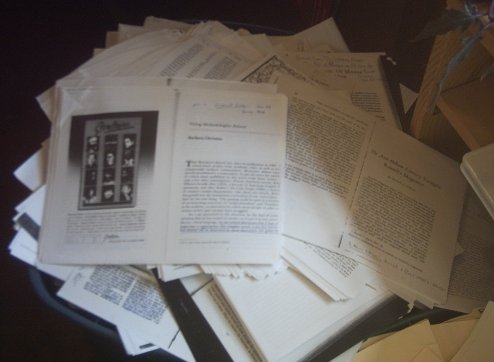
Graduate school in the humanities is a source of much wasted paper in this world. Shown above is barely a fifth of the photocopies Kathy and I collected in our combined ten years of coursework—I disposed of our doubles some time ago, and there’s still two file cabinet drawers yet to empty. If you’re currently studying, or if you’re considering a PhD in English, history, or another paperheavy discipline, here’s a tip: save the bibliographies and the syllabi; buy the books used if you can, new if you have to; take good notes and write summaries, and keep record of your own thoughts—but throw away recycle all those damned photocopies as soon as you’re finished with them!
i’ve got four filing cabinets full! i just can’t bring myself to
throw them awayrecycle them. even though i haven’t read most in several years.by Jeremy—Jul 22, 01:48 PM
i even see that pile and think… oooh, oooh, oooh, i’ll put them in my archive!
it really is quite a problem.
by Jeremy—Jul 22, 01:50 PM
Well, I thought about sending some to you, esp those copies of microfilms of texts by 16th c. English colonists and/or their relatives… But K said you probably didn’t need them.
by greg—Jul 22, 01:55 PM
oh, i would take them.
after the religion, politics and poetry book, i’d like to do some sort of comparative project.
i’ll even pay you to send them to me.
by Jeremy—Jul 22, 02:06 PM
I’ll send ‘em Monday. (I can’t promise good references, although most have title pages at least…)
by greg—Jul 22, 02:27 PM
It occurs to me that the end of the last sentence of this post should be, for J’s sake, “and know when it is you’re finished with them when it is you’re finished with them!” :)
by greg—Jul 22, 10:29 PM
why not get the paperwork scanned and then electronically filled.. four full cabinets can be stored on just 2gig of hard disc storage and if well referenced any single page can be found within 6 seconds…
just a thought
Take care Peter
by peter banks—Jul 5, 05:14 AM
Peter, I agree with you that, in principle, that would’ve been a good plan, but for three things: 1) Because I’m no longer in academia, I didn’t have much use for any of these photocopies; 2) at the time, I was preparing for a move, and I didn’t want to move this stuff at all; and 3) a greater proportion of these photocopies than any of my then profs would’ve wanted to admit are already easily available and searchable on JSTOR and other academic databases.
by greg—Jul 5, 08:08 AM
I must say, I tend to use Jstor and Project Muse. Most of my photocopies are of things not found on them and of 19th century editions or facsimile editions of poems/books of the 16th-18th centuries. of course, i should, and slowly, transferring these…
however, my home scanner is not very good, my new pc does not have anything but adobe acrobat, my home institution will not purchase it for me, the two scanners at my home institution are in the offices of two senior colleagues, one who does not use it, but he keeps it solely so that he can complain about letting you use it… and, again, my home institution has not, despite several requests ever purchased adobe for my office use…
by Jeremy—Jul 5, 09:17 AM
I didn’t have much need for the archival photocopies. It’s a bit of the golden age of American print being transferred to database. From the American Memory project to the American Periodical series, it’s fast becoming the case that you can a very large portion of the US print sphere in searchable fulltext digital archive. Not everything of course, but the sort of work I did that sent me to print archives was very limited.
PS. You should dump Adobe, or at least the Acrobat reader, on your PC. Use Foxit instead. It’s way faster.
by greg—Jul 5, 10:02 AM
lah-dee-dah, they think they are so foxy…
i’ll give them a try
by Jeremy—Jul 5, 10:13 AM
I dunno why adobe had to let the reader become slowass bloatware. It contributes not at all to the usefulness of PDF as a format.
by greg—Jul 5, 10:25 AM